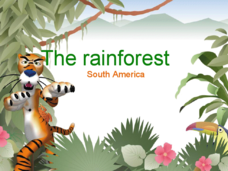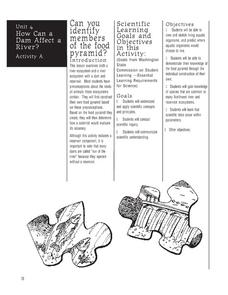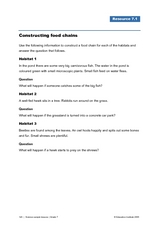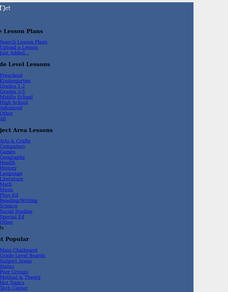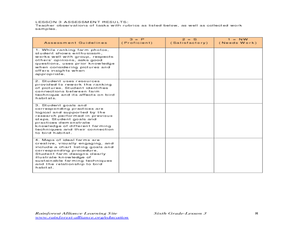Curated OER
Habitats
Photographs of different habitats ask viewers to consider who would live in each. Desert, polar, rain forest, freshwater, and ocean habitats are depicted. Each is followed by a slide with pictures and color graphics of the inhabitants....
Curated OER
The Rainforest: South America
What can one expect to see in the South American rainforest? Find out where humans sleep, what animals they encounter, what kind of plants they'll see, and what dangers lurk in the tall grasses and dense forests. This is a simple and...
Curated OER
Animals That Live in the Water
Ask your little learners which animals live in the water and which ones do not. They'll have 19 opportunities to assess and determine if the animal shown is water-dwelling or land-loving.
Curated OER
Wildlife Burrows
Burrowing animals are busy! Get your middle school ecologists busy as well by having them create a scale model of a burrowing population. They also design a PowerPoint or poster to explain their models.
Foundation for Water & Energy Education
How Can a Dam Affect a River? Activity A
Written for Washington state students in life science, this lesson provides an opportunity to examine the residents of local freshwater habitats. You or the class collects a water sample, and learners try to examine what organisms live...
Smarter Balanced
Uncommon Animals
Need to prepare for a performance task assessment on the topic of uncommon animals? Here's an activity that ensures all learners have the knowledge of key terms and concepts to approach the assessment.
Conserve Wildlife Foundation of New Jersey
The Great Peregrine Scavenger Hunt - On the Internet
The story of one bird provides valuable insight into general animal behaviors and interactions. Young researchers investigate the peregrine falcon using a web search. They analyze the behaviors of the raptor including its migration...
SeaWorld
Design a Fish
Craft some neat refrigerator magnets while studying ocean animals with a lesson about the anatomy of a fish. After kids learn about the different parts and shapes of fish, they use modeling compound to design their own fish.
NOAA
Deep-Sea Ecosystems – Entering the Twilight Zone
Imagine an ecosystem without any light or oxygen, where living things convert carbon dioxide into food. This ecosystem is thriving and might just be the largest ecosystem on our planet, yet we know very little about it. The lesson...
National Wildlife Federation
The Pollinator's Journey: Grades K-8
Bees get all the attention, but so many more creatures contribute to pollination. Scientists explore the role of pollinators as they learn about the parts of a flower and how it reproduces. They discover how plants rely on many different...
Curated OER
Animals Around Us
Young scholars view and discuss a Discovery Channel video that compares the animals found in four different habitats. They compare and contrast the characteristics of forests, deserts, wetlands and grasslands then choose one to depict...
Curated OER
Crustacean Critters
Young scholars explore the habitats of hermit crabs. In this crustacean lesson, students discover what animals need to survive. Working with live hermit crabs, young scholars explore how hermit crabs have adapted to their habitats.
Curated OER
Pond Water Web
Learners identify the different organisms in the food web. In this biology lesson, students create food chains using the information on cards. They explain what happens if an organism is removed or added in the web.
Curated OER
What's Down There
Students write an essay about the coral reefs. In this oceanography lesson plan, students investigate the reef of Bonaire and compare it to reefs that are not thriving. Students then explore the differences that contribute to the...
Curated OER
Building a Bird's Nest
Students identify local birds and their habitats. In this wildlife lesson, students list various birds that live in their area and match the descriptions of the birds to the photos. Students build a diorama of a birds nest.
Curated OER
The Very Busy Spider
Students determine the best habitat for spiders. In this spider lesson, students listen to a reading of Eric Carle's, The Very Busy Spider. They discuss the spider's habitat before visiting the schoolyard to look for spiders in their...
Curated OER
Animal Colors and Shapes
Learners investigate the natural characteristics of animals by completing a coloring activity. In this animal properties lesson, students investigate the reasons different animals have specific colors, and how it is essential for their...
Curated OER
Constructing Food Chains
Students explore different habitats and the food chains within. In this food web lesson students construct food chains for different habitats.
Curated OER
Cooperative Learning, Sci., Tech., Lang
Students research, write, edit, revise and present a paragraph, using word processor, about animal of their choice, including description, where animal lives, what it eats, its habits, e.g. is it endangered, migration, hibernation,...
Curated OER
Ecosystem Interactions in Refuges
Seventh graders, using national parks as models, illustrate the energy flow in ecosystems. Working in groups, they use murals, flow charts, or other visual displays to record their findings. Students represent the food chains and webs...
Curated OER
How can my breakfast help the birds?
Sixth graders design farms with a bird's habitat in mind. In this farm lesson plan, 6th graders research how sun grown coffee destroys a bird habitat, and then they make their own farm with a bird's habitat being preserved. They then...
Curated OER
I See a Coyote
Students role-play coyotes looking for natural resources. In this natural resources lesson, students examine the relationship between animal life and the environment. Students play a game that demonstrates how natural resources affect...
Curated OER
Guess Who? Coral
Fourth graders identify and group coral formations. In this coral identification lesson, 4th graders examine coral pictures, discuss vocabulary, and provide similarities and differences in the growth formations.
Curated OER
What Does it Take to be a Survivor? Part One
Young scholars explore marine animal adaptation. In this introductory ocean life biology instructional activity, students access prior knowledge by participating in a whole class "thought swap." Young scholars form two lines, respond to...
Other popular searches
- Habitats
- Animal Habitats
- Animals and Their Habitats
- Habitat Diorama
- Pond Habitat
- Zoo Animals Habitats
- Desert Habitats
- Habitat Project
- Ocean Habitats
- Animal Homes
- Animals and Habitats
- Cougar Habitat



